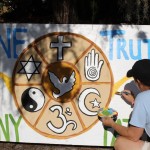So today I have the pleasure of lifting up a post by a friend of mine. Tripp has become for me an example of how a Baptist can live out their path with faithful consistency and radical hospitality. Tripp is a living reminder of the core of my Baptist roots, the good and rebellious stuff, that still has a grip on my heart. I have always and only experienced Tripp as a talented, grace-filled, loving ally. I am just floored that I have the honor to share this very personal story and reflection of his.
Thank you Tripp.
What is it about music that fucks with people’s sense of gender identity? Did David Bowie shape us so completely as a culture that we often think of singing as a cross-gender activity? Or emasculating? I really don’t know. What I do know is that I got called “fag” a lot in school because I was in the choir and once my voice changed I stopped singing because, you know, boys don’t sing. Not real boys. I wanted to be a real boy…whatever that is.
What the hell is a real boy, anyway? Pinocchio? I really don’t know, but the shame and guilt I experienced about something barely understood was poisonous and paralyzing. By the time I was in high school, the stories of suicides came to light. It was the middle of the 1980s and we lived in rural Virginia. Some young minds simply could no believe it would ever “get better.” It is still heartbreakingly outrageous.
And some of us weren’t in church… Still there was shame and guilt and this overarching sense of failure. So, to music, if you wanted to sing in the choir then you had to admit you had failed at being a boy.
Please excuse my profanity, but this shit has always pissed me off. Always.
I was in college when a girl I was dating told me to try out for the choir. She knew I wanted to, that I envied the kids in the choir, but there was this thing…this thing in me that wrestled with what it might mean if I sang…”My voice is too low,” I said. Well, she disabused me of that notion right quick and I auditioned for the choir. I remember the choir director always felt he was in some kind of firefight with the athletic department for money. We’ll fund masculinity but the arts are too effete for our cash.
Unless you’re Curt Cobain. Now, that’s a masculine form of music. Real men wear flannel and sing loud songs about loudness…and sex and drugs.
I wonder if the misogyny of rock is compensational. Men trying to carve out some space that says, nay, screams with electrified amplification, “I am not a fag!” turning themselves into bullies and everyone else into an object of some kind of appetite.
When I joined the choir in college, my father asked me if I were gay. That’s what he thought it might mean. It was a kind conversation. He was attempting to express sincere concern. But that’s what he thought it meant. Singing is queer.
But what I experienced was neither concerning or shameful. Choir was safe. It was shameless in so many ways. And in choir I was not a failed boy. It was an amazing social space where no one failed in such a strange fashion. I wonder now if there wasn’t a queerness to the choir that made it possible for us all to be the boys, girls, or other that were already were.
Musical space is still a queer space in my life. I play various musical instruments, sing in folk bands, and choirs. In each space (if a band is a space) or scene (if you know what I mean), I am aware that people gender me differently. Play in a bar late at night? Masculine. Very. Dress in a tux and sing in a concert hall? Gay. Very gay. My folk self is still a little dandy for some. Androgynous. Then there’s bluegrass. Good gawd, but bluegrass is a mess of gender confusion.
Bluegrass is the queerest of musical spaces. It’s hard to be butch with a banjo…unless it has bling. But if you play fast and hard, well…man up, brother! The sexual overtones of speed and volume are not to be ignored. This is why female banjo players struggle to this day to get any kind of traction. Banjos are for boys.
I hope that’s changing. Evie Ladin and others are trying to carve out space, sexing up the banjo in their own ironic way.
This post is supposed to be about Christianity and coming out in some way. So, let me offer this as a way of connecting it all. I was not raised in the church. It was through music that I found my way in, through the choir loft that I felt the Spirit move. It was a wondrous God whom I met, sung into existence by people so many communities would not accept. It was there that I learned the potential of what it means to be church.
I sat next to my gay brothers and sisters, all of us made androgynous in our choir robes, closeted in plain site. There was (and often still is) a don’t ask don’t tell policy for church musicians in many worshiping communities. The choir was always a separate kind of community within the church. Smokers. Drinkers. Queer space carved out and elevated above the pulpit, that’s the choir loft.
I wonder about praise and worship leaders and how they are often men playing manly rock, the aesthetics of Curt Cobain liturgized, musical masculinity set on stage for God. “Look at how male my God is,” it seems to say.
Not always. Tanya Riches proves that. Still, I can’t help but wonder about the masculinity of praise and worship bands.
I’ve never been oppressed for being someone who performs “at the margins of human sexuality.” Never. I’m not claiming that I have experienced anything like the cruelty that some have experienced by coming out. I was beat up a few times, but let’s get real.
I have wondered, however, if we all have to come out at some point, about how one activity defines us over and above other activities, how one kind of music is effete and another androgynous and again another butch. Joan Jett? Chrissy Hines? GaGa is always in drag, embodying a particular transvestism. And the church choir? What of us?
The church dealt with us by enshrouding our gender in a choir robe and setting us all aside, above, but aside. It was a safe place for many of us in the church. But I have always wondered…were we, are we closeted in plain sight?
Is the church concerned that maybe I am not a real boy after all? Or is it possible that in singing a new song to the Lord we can create a queer space that is called “the church,” all of us in an angelic choir free to be what we are made to be?
 Tripp Hudgins is a PhD student at Graduate Theological Union in Berkeley, California; a preaching pastor, Baptist cantor, liturgiologist, ecumenist, writer of articles, ethnomusicologist (hon.), and grateful husband. His work is an exploration of sonic theology, mandodoxy, found objects (such as grace, time, timbre, or other holy scrap), and some good old fashioned sangin’. He blogs at anglobaptist.org, is an associate pastor at First Baptist Church of Palo Alto, and a member of the Association of Welcoming and Affirming Baptists.
Tripp Hudgins is a PhD student at Graduate Theological Union in Berkeley, California; a preaching pastor, Baptist cantor, liturgiologist, ecumenist, writer of articles, ethnomusicologist (hon.), and grateful husband. His work is an exploration of sonic theology, mandodoxy, found objects (such as grace, time, timbre, or other holy scrap), and some good old fashioned sangin’. He blogs at anglobaptist.org, is an associate pastor at First Baptist Church of Palo Alto, and a member of the Association of Welcoming and Affirming Baptists.












